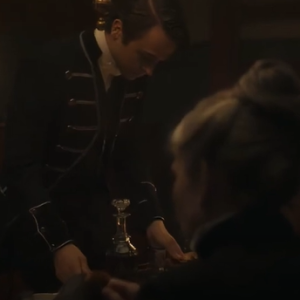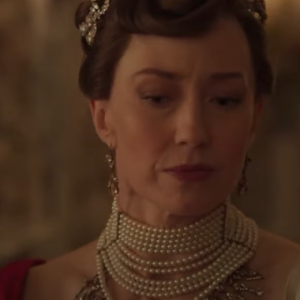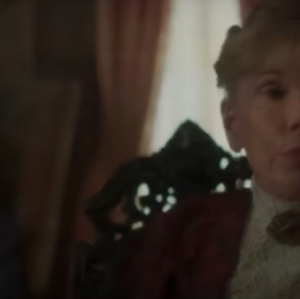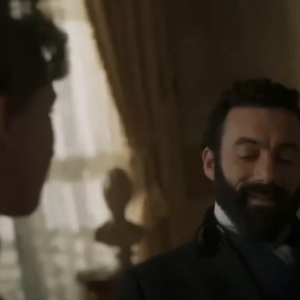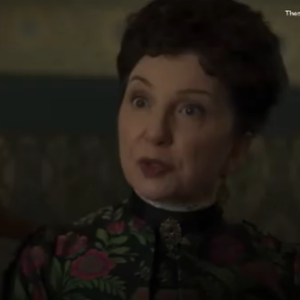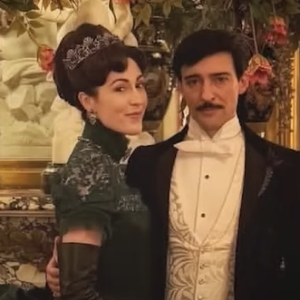In Season 3, Episode 8 of The Gilded Age, viewers were stunned when George Russell left Bertha, signaling the potential collapse of one of the most powerful and glamorous unions in the series. Though the show blends fiction with historical inspiration, the parallels between Bertha and her real-life counterpart, Alva Vanderbilt, have become impossible to ignore. Like Bertha, Alva was not born into old-money aristocracy; she fought her way into it, married into the Vanderbilt family, and clawed her way to the top of New York society with sheer ambition and iron determination. The driving question now is whether Bertha’s story will follow Alva’s—toward a scandalous and public divorce that could upend the very fabric of high society. Season 4 teases a darker, more turbulent path for Bertha as she navigates her husband’s disillusionment, the possibility of infidelity, and a society that may no longer revere her. And as creator Julian Fellowes uses history as both a guide and a creative playground, Bertha’s future may be even more complicated—and dramatic—than Alva’s ever was.
Alva Vanderbilt’s story is a tale of power, betrayal, and ultimate triumph—but it didn’t come without cost. Married to William K. Vanderbilt in 1875, Alva found herself quickly disillusioned with the Gilded Age’s promise of prestige through matrimony. Her husband, though wealthy and well-connected, lacked her hunger for social conquest. Instead of standing by her side, he distanced himself, indulging in racetracks, clubs, and increasingly public affairs. For Alva, this wasn’t just painful—it was humiliating. His open relationship with the Parisian socialite Nelly Neustretter was the final straw, especially since William flaunted the affair publicly, treating his mistress like a second wife. Alva, refusing to become another silent victim of her era, made a bold move that shocked the world: she filed for divorce in 1894. At a time when divorce was a scandal capable of social ruin, her decision sent shockwaves through upper society. Newspapers dubbed it the “Vanderbilt Sensation,” and the courtroom drama became a national obsession. Despite the potential fallout, Alva emerged victorious—gaining full custody of her children, a fortune in settlement, and control of several properties. She proved that even in a patriarchal society that sought to erase women for daring to speak out, one could carve out power with sheer resolve.
Now, The Gilded Age has brought that tension to life through Bertha Russell, who has spent three seasons maneuvering her way up the social ladder with military precision. Unlike Alva, Bertha’s husband George is a self-made man, inspired more by Jay Gould than William Vanderbilt. George has supported Bertha’s social ambitions from the beginning—until now. But Episode 8 marks a turning point: George leaves, visibly disillusioned not only by Bertha’s social scheming but by the emotional cost it has inflicted on their family, particularly the strategic marriage of their daughter Gladys to a Duke. While it initially appeared to be a crowning achievement, the deal now seems like a cold transaction, and George can no longer pretend otherwise. Add to this the bottle of laudanum he ominously eyes in the finale—possibly signaling an upcoming battle with addiction—and the future of the Russells hangs by a thread. If George spirals, could an affair or public scandal be far behind? Would Bertha, like Alva, be forced to protect her status by any means necessary—perhaps even by filing for divorce herself to avoid disgrace and regain control of her narrative?
Interestingly, Season 3 already laid the groundwork for such a seismic shift. Bertha’s decision to include divorced women at her Newport ball, an unprecedented move in her social circle, feels like more than simple rebellion—it feels like foreshadowing. The fact that she created a space for scandalized women at her table suggests she may soon become one of them. Alva Vanderbilt, too, was shunned by former friends after her divorce. She was ignored in church pews, dropped from guest lists, and treated as socially toxic. But instead of retreating, she struck back by arranging her daughter Consuelo’s marriage to the Duke of Marlborough—ensuring her family remained tied to power. Bertha mirrored this move in Season 3, engineering Gladys’s union with the Duke of Buckingham. The show, however, added complexity to the storyline: Gladys appeared happy, suggesting Bertha’s motives weren’t entirely selfish. Yet if Bertha’s marriage crumbles next season, Gladys’s title may serve the same purpose it did in real life—a shield against the loss of social prestige. It’s possible Season 4 will echo Alva’s narrative beat for beat, but with its own tragic and triumphant twists.
Alva’s life after her divorce was far from tragic. Within a year, she married Oliver Belmont, a man she loved deeply and who had long admired her. Their relationship had simmered for years behind the scenes, and their eventual union in 1896—one year after her scandalous split—offered Alva a second chance at personal happiness. Tragically, Oliver died in 1908, but their time together proved that love, even for women labeled as scandalous, was not out of reach. Alva would go on to become an advocate for women’s rights, using her wealth and status to champion the suffragist movement. This part of Alva’s journey opens even more possibilities for Bertha in The Gilded Age. Could Bertha Russell, scorned and possibly divorced, evolve into a new kind of power broker—one less obsessed with society balls and more focused on shaping policy or even influencing social reform? Julian Fellowes has shown with Downton Abbey that he’s not afraid to let his characters grow beyond the confines of their mansions, and Bertha could become the ultimate symbol of reinvention. 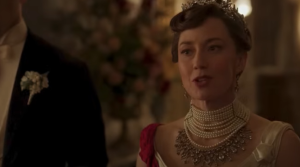
As fans await Season 4, the stakes couldn’t be higher. Will George and Bertha reconcile, or are they destined to follow in the footsteps of their historical counterparts? Will George fall into the darkness of addiction and scandal, or reclaim his identity apart from Bertha’s ambitions? Will Bertha crumble under the weight of a failed marriage, or rise anew with even greater determination and power? The echoes of history suggest multiple paths, and it’s clear that Fellowes is masterfully blurring the line between fact and fiction. One thing is certain: The Gilded Age is poised to deliver its most emotionally charged and socially explosive season yet, one where reputations will be shattered, alliances redrawn, and the battle for power will be more personal than ever before.
